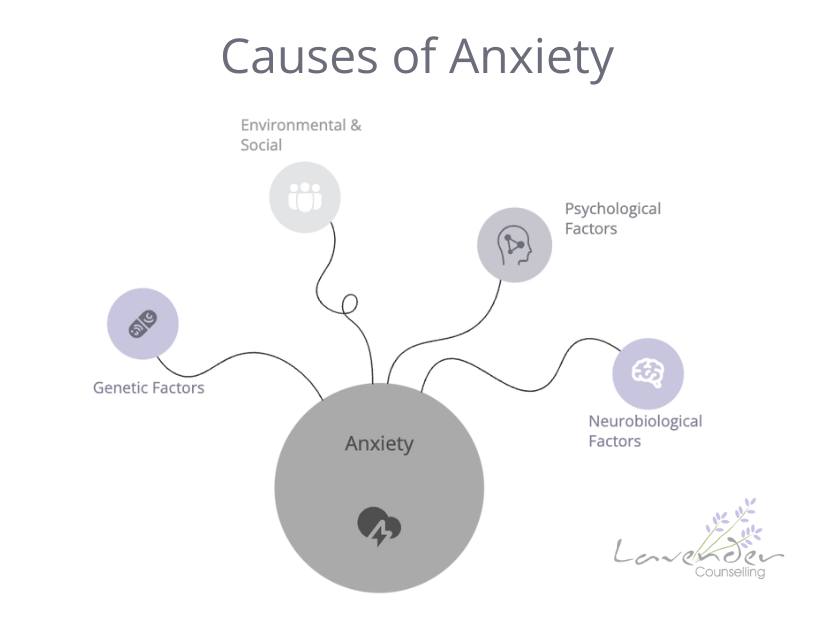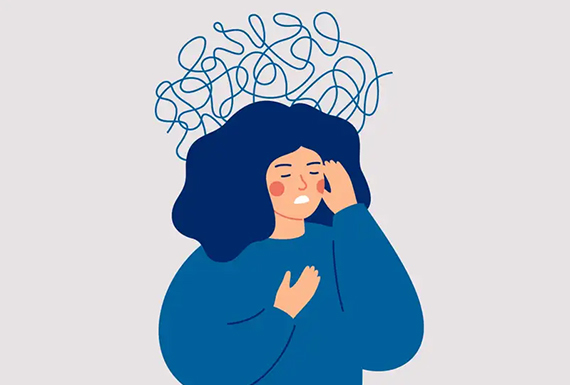Reclaim your emotional health through therapeutic therapy for anxiety
Reclaim your emotional health through therapeutic therapy for anxiety
Blog Article
Exploring Different Strategies in Counselling for Stress And Anxiety Disorder for Long-term Modification
When taking on anxiety conditions, it's important to explore a selection of counseling methods. Each approach provides one-of-a-kind insights and devices to aid you handle your symptoms efficiently. You could find that integrating techniques can yield the finest outcomes. Recognizing the subtleties of these techniques is key to cultivating long lasting adjustment. Suppose the appropriate combination could release a brand-new degree of psychological well-being for you?
Recognizing Anxiety Conditions: A Brief Introduction
Anxiety conditions, which impact numerous people worldwide, can greatly impact every day life. You may experience frustrating feelings of anxiety or fret that seem uncontrollable. These sensations can bring about physical signs like a racing heart, sweating, or perhaps dizziness. Typical types of anxiousness disorders consist of generalised anxiety disorder, panic attack, and social anxiety disorder. Each has distinct indicators, but they all share a tendency to interrupt your regular and relationships.Understanding the origin of your anxiousness is essential. It may stem from genes, mind chemistry, or life experiences. Acknowledging your triggers can help you manage your reactions better. It's important to bear in mind that you're not the only one in this struggle. Many individuals face comparable difficulties, and looking for help is a strong step toward feeling much better. By learning more about anxiousness conditions, you're already on the course to understanding and managing your condition better.
Cognitive-Behavioral Treatment: Testing Adverse Thought Patterns
In Cognitive-Behavioral Treatment, you'll begin by identifying the unfavorable thought sets off that add to your stress and anxiety. You'll work on changing them with more positive options as soon as you recognize these ideas. With each other, you'll build efficient coping strategies to aid handle your anxiousness in day-to-day scenarios.
Determining Adverse Idea Triggers

When you experience minutes of distress, acknowledging the particular triggers behind your adverse thoughts can be important in handling anxiety. Beginning by paying attention to situations that prompt sensations of fear or worry. Is it a crowded room, a forthcoming due date, or a discussion with particular people? Write these instances in a journal. This will aid you identify patterns in your thinking. Notice physical experiences that accompany your unfavorable ideas, like an auto racing heart or rigidity in your breast. By pinpointing these triggers, you gain understanding into what's sustaining your anxiety. Comprehending these connections is the initial step in challenging those thoughts and ultimately reclaiming control over your emotional feedbacks.
Replacing Thoughts With Positives
Testing negative thought patterns is a crucial action in transforming your way of thinking and decreasing anxiousness. You may frequently discover on your own trapped in cycles of self-doubt or tragic thinking. Instead of allowing these thoughts dictate your feelings, technique replacing them with favorable affirmations or sensible options. As an example, when you believe, "I can not handle this," move it to, "I can take care of challenges one step each time." This easy modification can greatly affect your emotion. On a regular basis determining and responding to these adverse thoughts helps develop a healthier internal dialogue. Keep in mind, it requires time and initiative, yet regularly practicing this method can cause long lasting modification, encouraging you to face anxiousness with restored self-confidence and strength.
Building Coping Strategies With Each Other
Replacing adverse ideas is only the start of handling stress and anxiety effectively. To produce lasting adjustment, you require to build coping strategies that empower you. Cognitive-Behavioral Treatment (CBT) assists you determine and test those unhelpful idea patterns. With each other, you and your therapist can explore just how these ideas influence your sensations and behaviors.Start by developing functional strategies, like journaling or mindfulness exercises, that allow you to challenge stress and anxiety head-on. When you encounter your worries progressively, you'll learn to react differently.

Mindfulness and Acceptance-Based Approaches: Growing Present-Moment Awareness
As you browse the complexities of anxiousness, including mindfulness and acceptance-based techniques can substantially improve your ability to grow present-moment understanding. By concentrating on the present moment, you'll discover that you can observe your ideas and feelings without judgment (Counseling services for anxiety). This practice aids you acknowledge your anxiousness without feeling overwhelmed by it.Engaging in mindfulness workouts, such as deep breathing, body scans, or assisted meditations, permits you to ground on your own in your present experience. Acceptance-based methods motivate you to welcome your emotions instead of combat against them. They shed their power over you.Incorporating these methods into your everyday regimen can transform how you respond to anxiousness when you approve your sensations. You'll create strength and discover to browse difficult scenarios with greater ease. Eventually, growing present-moment understanding lays the structure for long lasting adjustment, equipping you to lead an extra meeting life
Direct Exposure Therapy: Facing Fears Gradually
Exposure therapy assists you face your anxieties in a progressive means, making it less overwhelming. You'll discover techniques to face anxiety-provoking circumstances action by step, while likewise constructing coping techniques to manage your responses. This method equips you to take control and lower anxiousness in time.
Steady Exposure Techniques

When dealing with anxiety, gradually challenging your concerns can be a powerful way to restore control. This method, recognized as gradual direct exposure, involves slowly exposing on your own to the scenarios or items that trigger your anxiousness. Begin with much less intimidating circumstances and gradually work your way up to more challenging ones. If you're afraid of public speaking, you may start by speaking in front of a mirror, after that proceed to sharing ideas with a good friend, and at some point deal with a little team. Each step assists desensitize you to the concern, building your confidence in time. Remember, it's important to rate on your own and commemorate little success as you move via this process, enhancing your capability to take care of stress and anxiety properly.
Structure Coping Methods
Building efficient coping techniques is necessary for taking care of stress and anxiety, specifically as you challenge your concerns gradually - Counseling services for anxiety. One effective method is exposure treatment, where you begin by encountering your worries in a regulated manner. Begin with less frightening circumstances and slowly work your method as much as more challenging circumstances. This steady direct exposure helps desensitize you to anxiety sets off, making them much less overwhelming.Incorporate leisure methods, such as deep breathing or mindfulness, to calm your mind throughout direct exposure. Track your progression, celebrating little success in the process to increase your confidence. Keep in mind, it's all right to take your time; the goal isn't excellence however stable enhancement. By constructing these strategies, you'll equip yourself to browse anxiousness and embrace life extra totally
Psychodynamic Therapy: Uncovering Origin Reasons of Stress And Anxiety
Psychodynamic treatment discovers the subconscious mind, exposing the source of your anxiety. By analyzing your thoughts, sensations, and past experiences, this approach helps you discover underlying disputes and unsolved problems that may add to your current anxiety. You'll work with a therapist to examine childhood experiences, partnerships, and emotional patterns that form your actions today.As you get insight right into these much deeper layers of your psyche, you'll begin to recognize just how previous events influence your present actions. This understanding can cause catharsis, enabling you to refine feelings you could have suppressed.Through the therapeutic connection, you can also identify protection devices that might have developed over time, offering a more clear path to alter. Inevitably, psychodynamic therapy equips you with the tools to resolve your stress and anxiety at its core, advertising enduring makeover in your emotional well-being.
Integrative and Alternative Strategies: Combining Strategies for Greater Efficiency
Integrating numerous restorative methods can improve your trip towards taking care of stress and anxiety a lot more efficiently. By incorporating aspects from cognitive-behavioral treatment, mindfulness techniques, and holistic approaches, you can produce a tailored method that addresses your unique requirements. You may make use of cognitive-behavioral techniques to test adverse idea patterns while integrating mindfulness workouts to ground on your own in the existing moment.Additionally, checking out alternative techniques such as yoga or meditation can promote leisure and minimize anxiousness symptoms. This mix allows you to create greater self-awareness and resilience.Experimenting with these varied methods can assist you uncover what reverberates most with you. Bear in mind, it has to do with locating a harmony that works, instead than sticking to a single method. This integrative approach not just offers instant alleviation yet additionally fosters lasting skills for handling stress and anxiety, equipping you to recover control over your life.
The Duty of Assistance Systems: Structure Resilience Via Link
While it may seem that handling anxiety is a singular journey, having a strong assistance system can play an essential role in your resilience. Surrounding on your own with empathetic friends, household, or support system produces a secure room where you can freely share your sensations and experiences. You advise yourself that you're not alone in this struggle.These partnerships use inspiration and can offer functional coping techniques that have actually worked for others when you link with others. It's also an opportunity to obtain perspective; friends can assist you see scenarios in a different way, lowering sensations of isolation.Moreover, psychological assistance promotes a feeling of belonging, which can substantially relieve stress and anxiety symptoms. By leaning on your support group, you can construct durability and tackle obstacles extra effectively. Bear in mind, getting to out for help signifies stamina, and it can make all the distinction in your trip toward taking care of stress and anxiety.
Regularly Asked Questions
What Are the Typical Signs of Stress And Anxiety Disorders?
You might experience uneasyness, tiredness, problem focusing, irritation, muscular tissue tension, and sleep disturbances. Physical signs can include rapid heart beat, sweating, and shivering. Recognizing these signs early can aid you look for appropriate support and therapy.
How Much Time Does Treatment Generally Last for Anxiousness Problems?
Treatment for anxiety problems generally lasts anywhere from a few weeks to numerous months. It actually relies on your private demands, development, and the methods your specialist uses to help you handle your anxiety properly.
Can Drug Be Utilized Along With Therapy for Anxiety?
Yes, drug can definitely be made use of together counselling for anxiety with therapy for anxiety. Integrating both techniques usually improves therapy efficiency, helping you take care of signs while exploring underlying issues via counseling (Counseling services for anxiety). Always consult your doctor for individualized suggestions
Exist Self-Help Techniques for Taking Care Of Stress And Anxiety?
Yes, there are a number of self-help methods for managing stress and anxiety. You can practice mindfulness, participate in routine exercise, maintain a balanced diet regimen, establish a regular, and make use of deep breathing methods to help in reducing anxiousness signs and symptoms properly.
Exactly how Do I Know if I Required Professional Aid for Anxiety?

Report this page